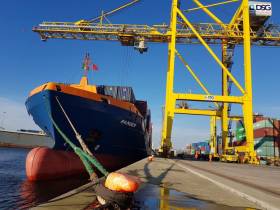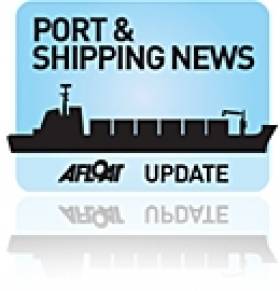Displaying items by tag: CMACGM
French Container Operator to Launch New Service Between Belfast Harbour and Mainland Europe
French container shipping giant CMA-CGM is to add a new call to Belfast Harbour to its Irish Sea Express CS container feeder service.
The new container service will boost capacity and service options for both importers and exporters in Northern Ireland.
CMA-CGM which is the third largest container line will run the service between Belfast Harbour’s Victoria Terminal 3 (VT3) and a number of UK and European ports, including Dunkirk and Rotterdam.
Operating on a weekly rotation, the service will see vessels including the Mistral, Allegro (see photo) and Elbteam calling at Belfast Harbour.
Since 2018, over £30m has been invested at the VT3, including the installation of fully electric ship-to-shore cranes in 2020, significantly improving safety, sustainability, efficiency and capacity, and making VT3 one of the most modern container terminals on the island of Ireland.
Following the recent investment, the terminal handled 126,000 container units in 2022 and a record 132,000 the previous year, which was the highest level of container traffic since 2008.
The CMA CGM Group is a global player in sea, land, air and logistics solutions, serving more than 420 ports around the world across 5 continents, with a fleet of around 600 vessels. The Group is present in 160 countries through its network of more than 400 offices and 750 warehouses.
Michael Robinson, Port Director at Belfast Harbour, said: “This new service from CMA-CGM will provide increased frequency of container services calling at Belfast, offering benefits for both importers and exporters in Northern Ireland.”
Alan Horner, Managing Director of CMA-CGM, said: “In line with CMA CGM group’s innovative approach to maritime development we are delighted to add Belfast to our global port coverage where we will leverage the synergies between our shipping services on the main intercontinental routes and our revamped intra-regional lines in the Irish Sea".
"The additional port call at Belfast gives our Northern Ireland clients direct access to our over 257 shipping routes and 420 ports of call worldwide.”
Oldest Shipping Company In the World Bids Farewell But 'Containerships' Continue Irish Services
#ports&shipping - In what was considered to be the oldest existing shipping company and originally Scottish based has merged this month with a French owned container giant's Finnish subsidiary, writes Jehan Ashmore
MacAndrews which was established in 1770 dissapeared from the shipping scene on 1 April marking a long association as part of the UK shipping industry. The demise of MacAndrews GmBH followed the merger by French owners CMA CGM into a single brand through their subsidiary Containerships.
In 2002 MacAndrews had been aquired by the German concern that led to headquarters relocating to Hamburg, but retained its original name. The company the following year was acquired by CMA CGM from Andrew Weir Shipping whose ship managment arm as previously reported on Afloat included former RMS St. Helena which notably made a once-off charter cruise to Irish ports
The historic company of MacAndrews Line can trace its origins to its founder William McAndrew from Elgin, Scotland. At just 18 year's old, he traded in importing fruit from Spain, Portugal and the Azores. This led offices to be opened in London and Liverpool.
MacAndrews operations included calls to Ireland that continue through Containerships in the provision of Intra-European transport. Of the Irish ports Containerships call to Dublin, Cork and Belfast.
Among the network of routes from Ireland is the Portugal Service linking the Iberian nation with the UK, Ireland, France, Spain and the Netherlands. This is a two-loop weekly door-to-door multimodal service linking the ports of Liverpool, Dublin, Setúbal, Leixoes, Dunkirk, Rotterdam and Tilbury.
A trio of containerships, each with a 803TEU nominal capacity operate the service among them MV Ranger (pictured above) in Dublin Port at DSG's lo-lo terminal. Also note yesterday's related stories.
The integration of MacAndrews into Containerships will allow for the creation of a tailored intra-regional service, in what CMA CGM Group desrcibe as a “Customer Centricity” strategy. To service Containerships 26 maritime services and 8 inland services there is a fleet of 32 vessels and 700 trucks.
#18,000containerships – According to LloydsList.com, French global containership giant, CMA CGM has joined the small group of container lines to produce good results in the third quarter, with a threefold increase in net profits to $201m as cargo volumes reached an all-time high.
Several other leading carriers lost money in the same period, the exception being Maersk, which outshone the rest of the industry.
Third-ranked CMA CGM achieved a return on invested capital of 8.2%, down from 10.3% a year earlier and below Maersk's 13.8%.
Consolidated turnover was 6.4% higher at $4.4bn, while cargo volumes rose 8.3% to 3.2m TEU. Average revenue per teu decreased by 1.8%.
The group, headed by founder and chairman Jacques Saadé, confirmed that the Ocean Three alliance with China Shipping and United Arab Shipping would launch in early 2015. The partnership was signed in September shortly after the P3 collaboration between Maersk, Mediterranean Shipping Co and CMA CGM was disbanded following rejection by the Chinese competition authorities.
Ocean Three has already been approved by the Federal Maritime Commission in Washington without a detailed review because of its low market share in the US trades.
CMA CGM said its third-quarter performance had been underpinned by steady growth in the Asia-Europe, intra-Asia and Oceania trades.
The line has also expanded in West Africa through its Delmas subsidiary and recently purchased 7,000 new reefer containers. The target is to carry 1m reefer containers in 2015.
Operating costs per teu have declined by 0.4%. Bunker consumption per TEU fell 3.4 % compared with the third quarter of 2013.
The line said this mainly reflected higher vessel utilisation, plus continued energy-efficiency efforts, including modification of bulbous bows. This change, implemented in dry dock, optimises the vessel design to the speeds operated under slow steaming.
Modifications have already been made to 15 vessels, with 10 more planned. This results in fuel and CO2 emission savings in excess of 5% per voyage, the company said.
For the nine-month period, the group's turnover came to $12.5bn, a 4.3% increase over the year. Cargo liftings rose 7.4% to 9.1m teu, and the core operating margin was stable at $638m.
Looking ahead, CMA CGM said it would be taking delivery of six 18,000 TEU vessels in 2015. These are upgrades in the size of six newbuildings under construction in China and South Korea.
Lloyd's List revealed earlier in the year that the specifications of a trio of ships being built at Shanghai Waigaoqiao Shipbuilding have been enlarged from 16,000 TEU to a nominal 17,700 TEU.
This will be the first time a non-South Korean shipyard will construct ships of this capacity. Another three are being built by Samsung Heavy Industries.
When the order for these was originally placed, the size was to be 12,600 TEU.
CMA CGM said the final quarter was likely to be characterised by the usual seasonal volumes slowdown, freight-rate volatility and lower bunker prices, but that its volume growth should nevertheless exceed that of the market as a whole.
For further news stories and much more visit: the Lloyds List website HERE.
IEA Export Industry Awards to Shipping
In the category of Short Sea Shipping Company of the Year, sponsored by the Irish Maritime Development Office, which recognises the strategically important role of short sea shipping to our economy, the winner of the award was CLDN Colbefret Group.
The Belgium operator opened two new routes from Dublin to Rotterdam and Zeebrugge in November last year, providing a range of transport options to Irish exporters selling to Europe. Since then Cobelfret have gradually introduced new Con-Ro (Containers and Roll-On/Roll-Off) vessels onto the continental routes. The six 25,000 gross tonnes newbuilds were built by FGS Flensburg, Germany and the latest unit Opaline, is due to make a Dublin debut tomorrow.
Cobelfret's operations in Dublin are based in Alexandra Basin East using the ports No. 2 ro-ro linkspan berth. A previous linkspan built in the 1950's was demolished last summer to develop a larger linkspan, to cater for larger tonnage like the Opaline. The new vessel has 2,907 lane metres for freight vehicles spread over three decks and a container capacity for 854 TEU mafi-trailers.
Donegal based Marine Harvest won the Seafood Export Award, sponsored by Bord Biá. The company is an indigenous fully-integrated salmon breeding, farming and processing operation, exporting premium products to Europe and North America.
The overall winner of the IEA's Export Industry Award for 2010 was the Irish Dairy Board.

























































